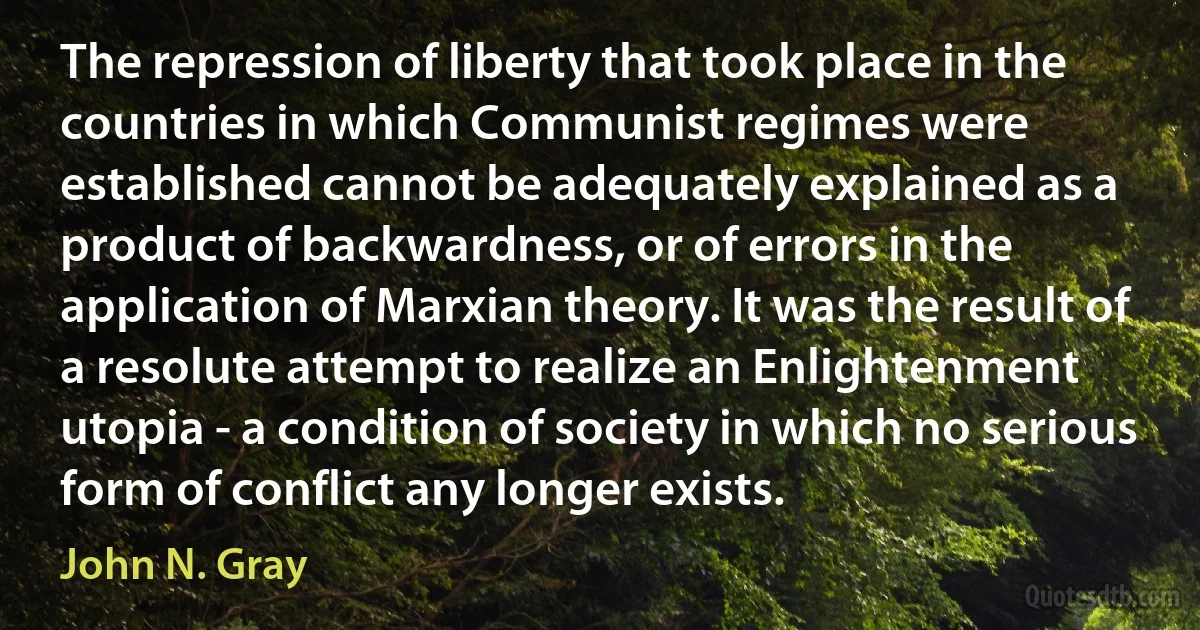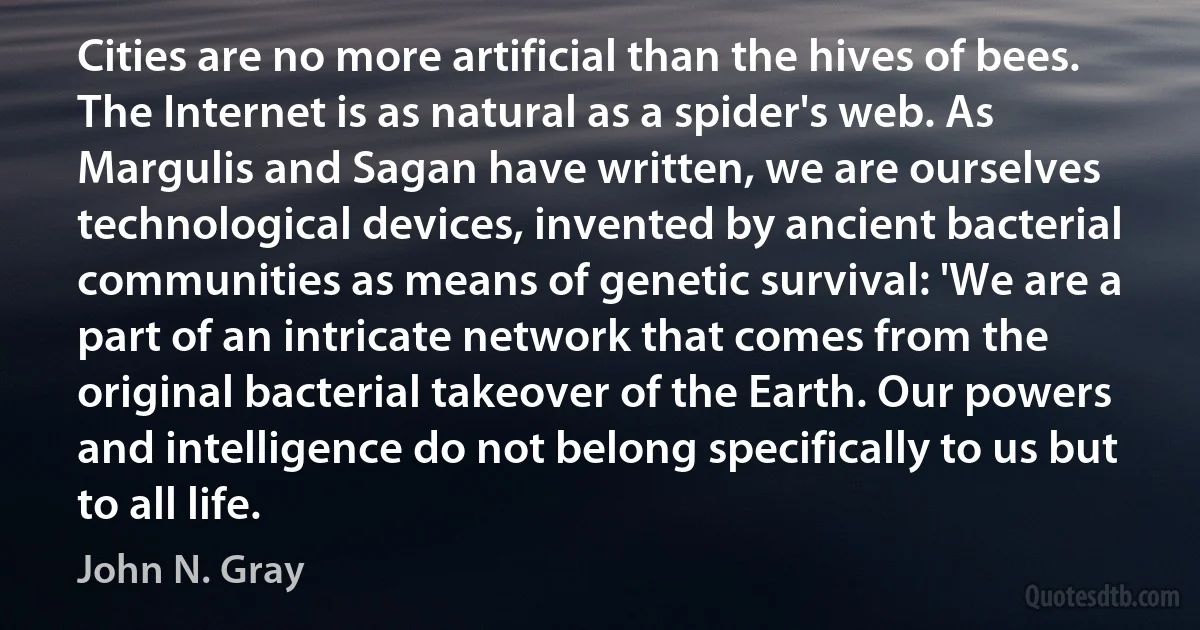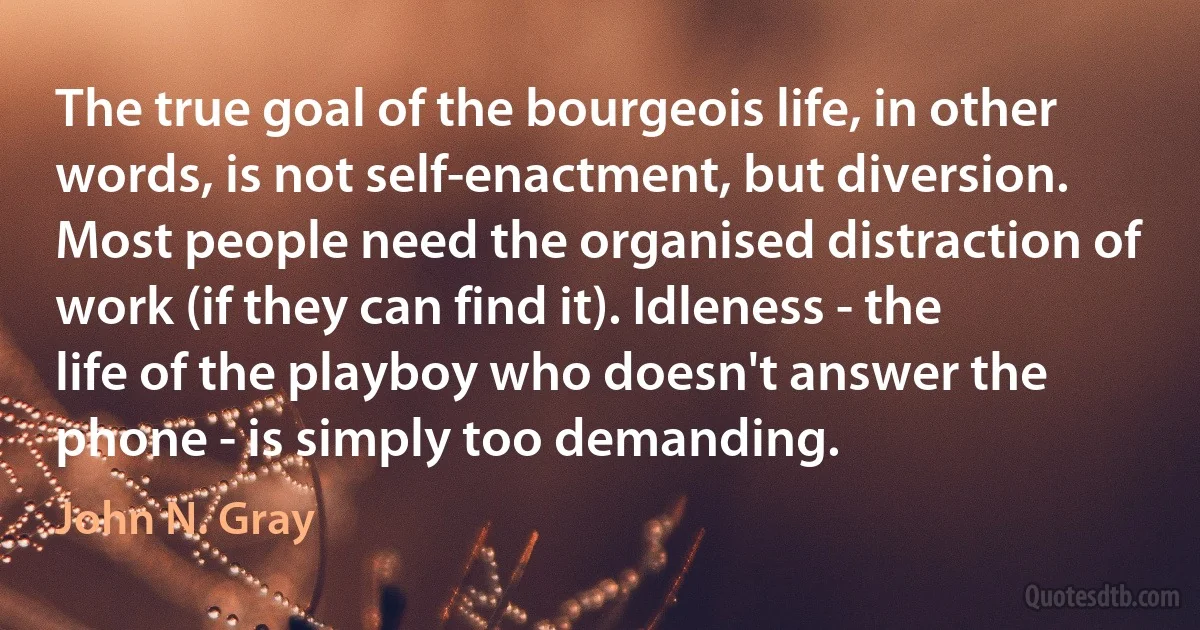John N. Gray quotes - page 4
John N. Gray is a British philosopher and author, widely known for his critiques of liberalism and humanism. His works address topics such as political philosophy, the limits of progress, and the complexities of human nature. He has profoundly influenced contemporary debates on politics, ethics, and society. Here are 159 of his quotes:
Today those who peer into the future want only relief from anxiety. Unable to face the prospect that the cycles of war will continue, they are desperate to find a pattern of improvement in history. It is only natural that believers in reason, lacking any deeper faith and too feeble to tolerate doubt, should turn to the sorcery of numbers. Happily there are some who are ready to assist them. Just as the Elizabethan magus transcribed tables shown to him by angels, the modern scientific scryer deciphers numerical auguries of angels hidden in ourselves.

John N. Gray
Theories of modernisation are cod-scientific projections of Enlightenment values. They tell us nothing about the future. But they do help us to understand the present. They show the lingering power of the Christian faith that history is a moral drama, a tale of progress or redemption, in which - despite everything we know of it - morality rules the world.

John N. Gray
The practical effects of the Marxian-Federovian cult of technology were ruinous. Inspired by a materialist philosophy, the Soviet Union inflicted more far-reaching and lasting damage on the material environment than any regime in history. Green earth became desert, and pollution rose to life-threatening levels. No advantage to mankind was gained by the Soviet destruction of nature. Soviet citizens lived no longer than people in other countries - many of them a good deal less.

John N. Gray
In a traditional reading eating the apple was the original sin; but, as Gnostics understood the story, the two primordial humans were right to eat the apple. The God that commanded them not to do so was not the true God but only a demiurge, a tyrannical underling exulting in its power, while the serpent came to free them from slavery. True, when they ate the apple Adam and Eve fell from grace. This was indeed the Fall of Man – a fall into the dim world of everyday consciousness. But the Fall need not be final. Having eaten its fill from the Tree of Knowledge, humankind can then rise into a state of conscious innocence. When this happens, Herr C. declares, it will be ‘the final chapter in the history of the world.

John N. Gray
Today, for the mass of humanity, science and technology embody 'miracle, mystery, and authority'. Science promises that the most ancient human fantasies will at last be realized. Sickness and ageing will be abolished; scarcity and poverty will be no more; the species will become immortal. Like Christianity in the past, the modern cult of science lives on the hope of miracles. But to think that science can transform the human lot is to believe in magic. Time retorts to the illusions of humanism with the reality: frail, deranged, undelivered humanity. Even as it enables poverty to be diminished and sickness to be alleviated, science will be used to refine tyranny and perfect the art of war.

John N. Gray
For a consistent naturalist science can only be a refinement of animal exploration, a practice humans have devised for finding their way in the bit of the universe in which they have so far survived. Instead of thinking of science as a law-seeking activity, we can think of it as a tool humans use to cope with a world they will never understand.

John N. Gray
The modern world inherits the Christian view in which salvation is played out in history. In Christian myth human events follow a design known only to God; the history of humankind is an ongoing story of redemption. This is an idea that informs virtually all of western thought – not least when it is intensely hostile to religion. From Christianity onwards, human salvation would be understood (at least in the west) as involving movement through time. All modern philosophies in which history is seen as a process of human emancipation – whether through revolutionary change or incremental improvement – are garbled versions of this Christian narrative, itself a garbled version of the original message of Jesus.

John N. Gray
Many people today hold to a Gnostic view of things without realizing the fact. Believing that human beings can be fully understood in the terms of scientific materialism, they reject any idea of free will. But they cannot give up hope of being masters of their destiny. So they have come to believe that science will somehow enable the human mind to escape the limitations that shape its natural condition. Throughout much of the world, and particularly in western countries, the Gnostic faith that knowledge can give humans a freedom no other creature can possess has become the predominant religion.

John N. Gray
Like other human freedoms, the freedoms embodied in market institutions are justified inasmuch as they meet human needs. Insofar as they fail to do this they can reasonably be altered. This is true not only of the rights that are involved in market institutions. It is true of all human rights.

John N. Gray
Before Christianity suicide was not in any way troubling. Our lives were our own, and when we tired of them we were at liberty to end them. One might think that as Christianity has declined, this freedom would be reclaimed. Instead secular creeds have sprung up, in which each person's life belongs to everyone else. To hand back the gift of life because it does not please is still condemned as a kind of blasphemy, though the offended deity is now humanity instead of God.

John N. Gray
Humanists today, who claim to take a wholly secular view of things, scoff at mysticism and religion. But the unique status of humans is hard to defend, and even to understand, when it is cut off from any idea of transcendence. In a strictly naturalistic view – one in which the world is taken on its own terms, without reference to a creator or any spiritual realm – there is no hierarchy of value with humans at the top. There are simply multifarious animals, each with their own needs. Human uniqueness is a myth inherited from religion, which humanists have recycled into science.

John N. Gray
While the Marxist faith in central planning is now confined to a few dingy sects, a quasi-religious belief in free markets continues to shape the policies of governments.Many writers have pointed to the havoc and ruin that have accompanied the imposition of free markets across the world. Whether in Africa, Asia, Latin America or post-communist Europe, policies of wholesale privatisation and structural adjustment have led to declining economic activity and social dislocation on a massive scale.

John N. Gray
An old fairy tale has it that science began with the rejection of superstition. In fact it was the rejection of rationalism that gave birth to scientific inquiry. Ancient and medieval thinkers believed the world could be understood by applying first principles. Modern science begins when observation and experiment come first, and the results are accepted even when what they show seems to be impossible.

John N. Gray
As commonly practised, philosophy is the attempt to find good reasons for conventional beliefs. In Kant's time the creed of conventional people was Christian, now it is humanist. Nor are these two faiths so different from one another.Over the past 200 years, philosophy has shaken off Christian faith. It has not given up Christianity's cardinal error - the belief that humans are radically different from all other animals.

John N. Gray
Though it is often assumed that naturalism must be hostile to religion, the opposite is true. Enemies of religion think of it as an intellectual error, which humanity will eventually grow out of. It is hard to square this view with Darwinian science – why should religion be practically universal, if it has no evolutionary value?

John N. Gray
The idea that consciousness is a mystery is a prejudice inherited from monotheism. The early seventeenth-century French philosopher René Descartes believed that animals other than humans are insensate machines. Obviously, this was a restatement in rationalist terms of the Christian belief that only humans have souls. Even if mind and matter were categorically distinct, that would not mean humans alone have minds. It was reported that in order to test his theories, Descartes used to throw animals out of the window and observe their reactions. Looking at behaviour of this kind, one might reasonably conclude that humans are the senseless machines.

John N. Gray
Action preserves a sense of self-identity that reflection dispels. When we are at work in the world we have a seeming solidity. Action gives us consolation for our inexistence. It is not the idle dreamer who escapes from reality. It is practical men and women, who turn to a life of action as a refuge from insignificance.

John N. Gray
John N. Gray

Photo:
Vera de Kok,
CC BY-SA 4.0
Occupation: British Author
Born: April 17, 1948
Quotes count: 159
Wikipedia: John N. Gray










